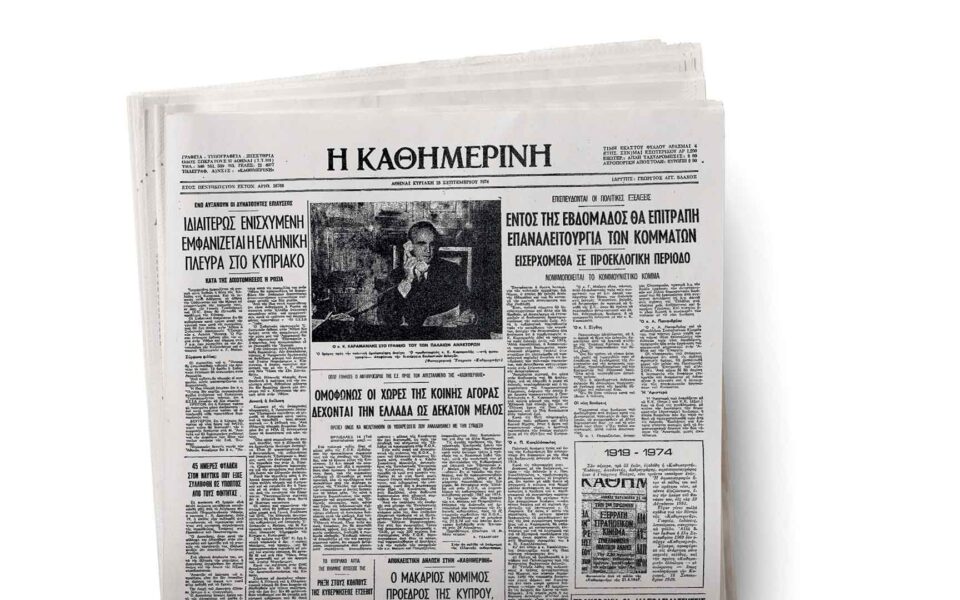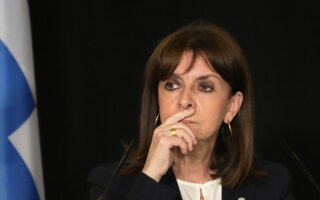Reflecting on half a century of Greek democracy
Kathimerini launches a discourse on the Metapolitefsi era through a conference emphasizing historical reflection and national self-understanding

A three-day conference commemorating the 50th anniversary of the restoration of Greek democracy, a period known as the Metapolitefsi, is scheduled to take place from February 29 to March 2 at the National Gallery in Athens.
On September 15, 1974, Kathimerini resumed publication after a seven-year hiatus, coinciding with its initial release on September 15, 1919. During the dictatorship, the newspaper’s deliberate silence, led by publisher Eleni Vlachou, sent a resounding message of disobedience to the regime and served as a practical defense of press freedom against censorship.
The restoration of democracy in the summer of 1974 marked a pivotal moment in modern Greek history. In the period between July 1974 and June 1975, the country faced a critical crossroads amid newfound freedom and simultaneous internal and external crises. In these conditions, a newspaper was indispensable – one that, throughout its history, incorporated diverse political tendencies and perspectives on democracy, progress, and Greece’s position in Europe and the world.
The institutional era known as the Metapolitefsi spanned one year from the fall of the dictatorship and the return of Konstantinos Karamanlis to Greece, culminating in the adoption of the new Constitution. Greece’s transition to democracy, faster, more effective and notably bloodless compared to its Southern European counterparts (Spain, Portugal), marked a significant chapter in its history.
In commemoration of the 50th anniversary of the restoration of Greek democracy, the conference, titled “50 Years of the Metapolitefsi: The Accomplishments and Shortcomings of the Third Hellenic Republic,” is organized by Kathimerini newspaper, the National Bank Cultural Foundation (MIET), Delphi Economic Forum, and the Hellenic Observatory at the European Institute of the London School of Economics and Political Science (LSE), and will take place at the National Gallery in Athens.
Participating in discussions that will take a historical review and offer reflections on the country’s future will be President Katerina Sakellaropoulou, Prime Minister Kyriakos Mitsotakis and former premiers. British historian Mark Mazower of Columbia University will deliver the keynote speech, offering insights into how the Metapolitefsi period aligns with the bicentenary of the modern Greek state. Various politicians and officials who have played pivotal roles in critical areas will be invited to respond to questions from experts and journalists on separate panels.
Toward the end of the conference, a debate will address the most important reforms still pending in the country. This discussion will feature Yannis Stournaras, the governor of the Bank of Greece, Stathis Kalyvas, Gladstone Professor of Government at Oxford University, Hugo Dixon, commentator-at-large for Reuters, Kevin Featherstone, LSE professor and director of the Hellenic Observatory, and Christina Koulouri, professor of modern and contemporary history at Panteion University of Social and Political Sciences in Athens.
The organizing committee is made up of Mazower, Featherstone, as well as Kostas Kostis, director of MIET and professor of economics and social history at the University of Athens, Elaine Papoulias, executive director of the Minda de Gunzburg Center for European Studies (CES) at Harvard University, Symeon Tsomokos, founder of Delphi Economic Forum, and Alexis Papachelas, executive director of Kathimerini newspaper.
Mark Mazower: Achievement worth celebrating
“In an age when postwar democracy comes into question as never before around the world, the achievement of the Greek Metapolitefsi stands out as an achievement worth celebrating and reflecting upon. This conference will provide a unique and unrepeatable opportunity to do so.”
Kevin Featherstone: Greece’s place in the world
“This conference uses an important milestone to reflect on contrasting patterns of change and continuity in Greece. The Metapolitefsi belongs to Greece, but it parallels a wave of democratization at the time in other countries also. Asking ‘What kind of society is Greece today?’ allows us to better place it in an international frame and to assess its progress. I am honored to be part of such a conference and delighted that such important speakers will join us.”
Elaine Papoulias: A challenge for democracy
“The 50th anniversary of the Metapolitefsi comes at a moment when democracies around the world face dark threats once considered forever buried in history. By convening eminent scholars and key leaders at the helm of the country’s transformation, this conference aims to reflect on the forces which shaped Greece’s post-junta transition and the conditions which propelled as well as endangered its democratic trajectory. The goal is not only to mark Greece’s important milestones, but to also consider the environment in which democracy can thrive or backslide, and how civic consciousness can be advanced. At a time when the rise of authoritarian regimes globally has frayed civic culture and exposed the fragility of governance, the examination of Greece’s transition is an important exercise for all citizens and public leaders concerned with building enduring and resilient democracies.”
Symeon Tsomokos: An opportunity for reflection
“The Metapolitefsi period not only restored but also significantly contributed to the deepening of democracy and institutions in our country. Nevertheless, it also gave rise to a series of distortions and entanglements that continue to trouble us. Reflecting on and studying the multiple facets of these 50 years is a prerequisite to charting the new course of the country with greater certainty and self-confidence.”
Alexis Papachelas: Fostering a vibrant dialogue
“The last 50 years of our history have been densely packed with events. This year marks the 50th anniversary of the Metapolitefsi, providing a significant opportunity for reflection on our accomplishments, failures as a nation, the strength of our institutions and democracy and the outstanding major changes and reforms. Discussions during the conference will involve individuals who have shaped or handled the country’s fortunes in the past, as well as foreign academics and experienced observers of Greek affairs.
“The objective is to foster not monologues but a vibrant dialogue. The initiative for this conference was undertaken by Kathimerini, in collaboration with our key partners, as it believes that a crucial chapter of modern Greek history is closing, demanding a candid assessment and reflection on how to rectify the legacies left by the Metapolitefsi.
“This is a substantial and necessary conversation that will take place during the conference and, we hope, through the columns of the newspaper.”
Kostas Kostis: Not a traditional conference
“In 1974, Greece, with its transition to democracy, aligned itself with the third wave of democratization or what is termed democratic globalization. It’s worth noting that in the early 1970s, there were approximately 35 democracies worldwide; by 2008, that number had risen to over 160. Therefore, the Greek Metapolitefsi represents one of the initial steps in this global process. The conference aims to examine how Greece became part of this process and how it evolved until 2008, when a process of deglobalization began, with unknown consequences so far.
“This meeting will not follow the pattern of a traditional conference. Former prime ministers, the current prime minister, and the president of the republic will present their views in discussions with journalists or scholars. Additionally, ministers of the Metapolitefsi will engage in conversations with academics on panels covering areas such as the economy, the political system, the welfare state, institutions and justice, foreign policy and the environment. The event will conclude with a roundtable discussion featuring Stathis Kalyvas, Christina Koulouri, Hugo Dixon, Kevin Featherstone and Yannis Stournaras, examining the country’s most significant pending reform issues. The central speaker for the event will be Professor Mark Mazower of Columbia University, New York.
“It is a major success for the organizers to have included such prominent speakers and commentators in the discussion on the Metapolitefsi, making the event exceptionally pioneering in the context of Greek affairs.
“MIET took the lead in organizing this event as part of its efforts to expand its activities and pursue collaborations with other organizations, both academic and non-academic, Greek and international. MIET takes great pride in organizing this event and believes in its absolute success.”





